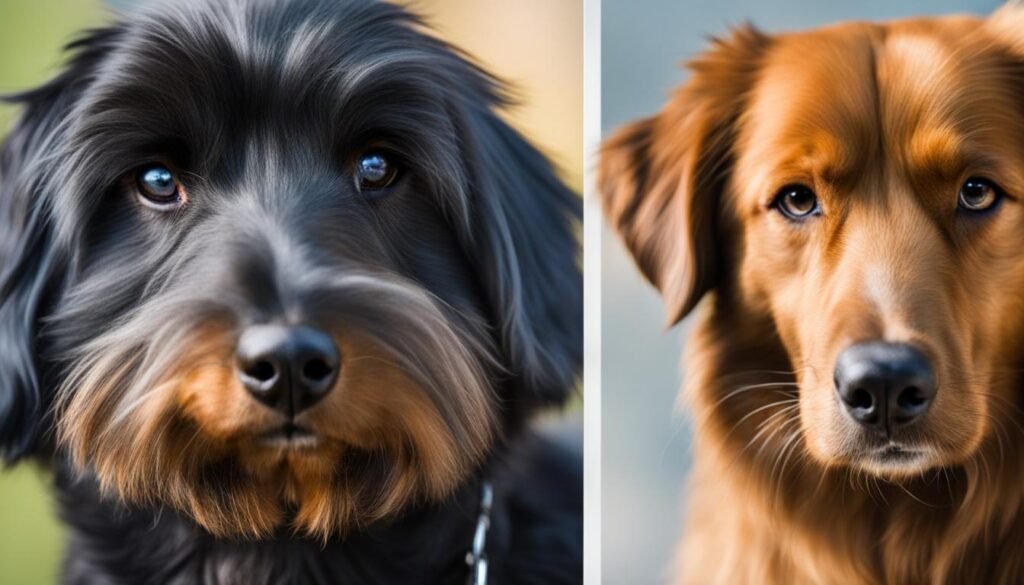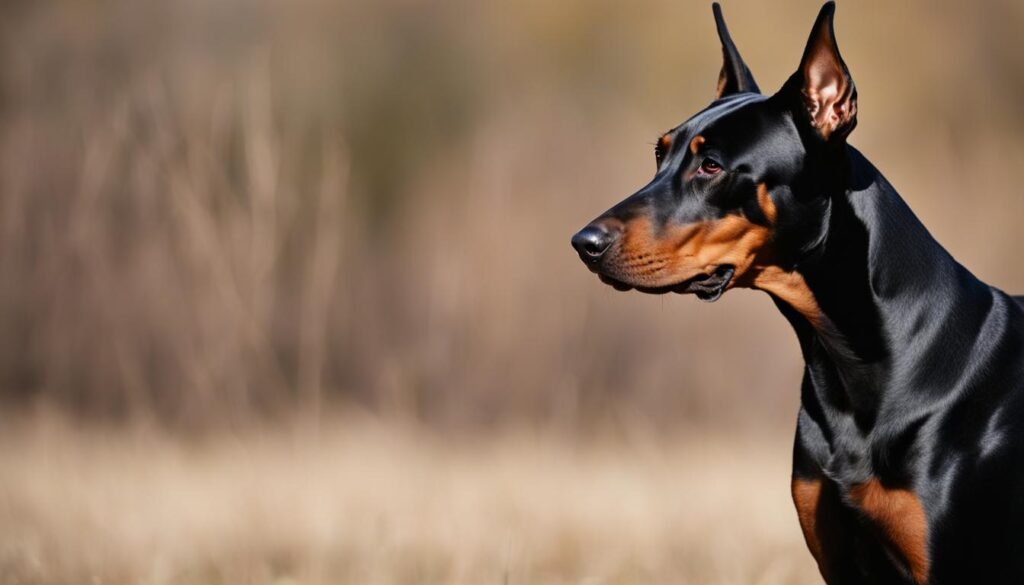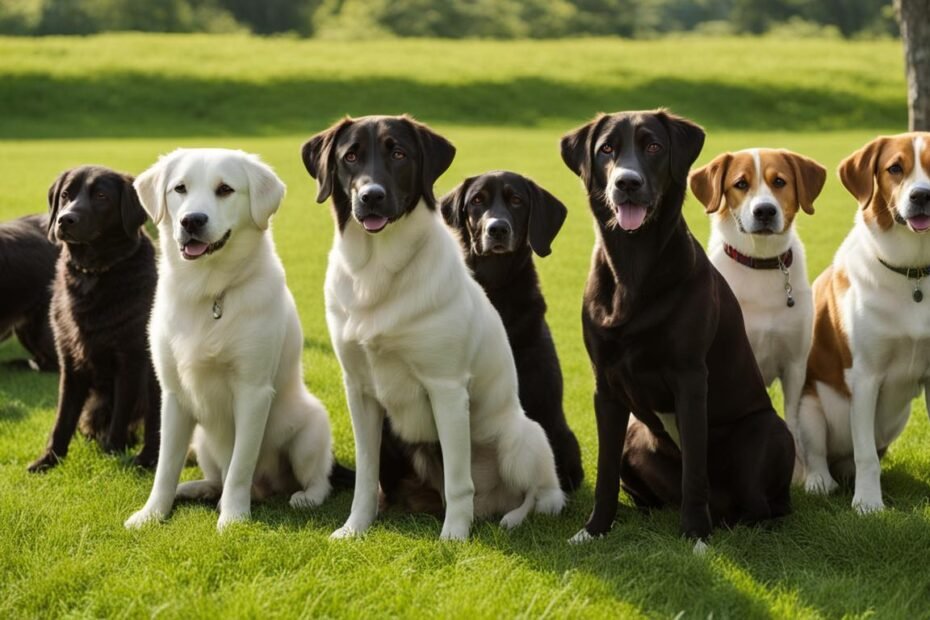Not all dog coats are the same. There are different types of dog hair and fur that determine the texture, length, and grooming needs of a dog’s coat. Smooth-coated dog breeds have short, smooth hair that lays close to the body and is often glossy. Examples of smooth-coated breeds include Pointers, Doberman Pinschers, and Boxers. These breeds are generally low-maintenance when it comes to grooming, but may still require regular brushing and may need a dog jacket in colder weather.
Key Takeaways:
- Smooth-coated dog breeds have short, smooth hair that is often glossy.
- Examples of smooth-coated breeds include Pointers, Doberman Pinschers, and Boxers.
- Smooth-coated dogs are generally low-maintenance in terms of grooming, but may still require regular brushing.
- During colder weather, smooth-coated breeds may benefit from wearing a dog jacket.
- Smooth-coated dogs have a sleek appearance and are popular among pet owners.
Understanding Dog Coat Types: Hair vs. Fur
The terms “hair” and “fur” are often used interchangeably when referring to a dog’s coat. Technically, there is no difference between the two, as they are made of the same material. However, when people talk about dogs with hair vs. fur, they are usually referring to the difference between single-coated and double-coated breeds. Single-coated dogs have a single layer of hair all over their body, while double-coated dogs have an outer layer of coarse guard hairs and a dense undercoat. Smooth-coated breeds fall under the single-coated category.
Single-coated breeds like Smooth-Coated Dogs have a hair-like texture that is short, smooth, and often glossy. Their coat lies close to the body, enhancing their sleek appearance. Examples of smooth-coated breeds include Dalmatians, Bloodhounds, Great Danes, and French Bulldogs. These breeds are known for their athleticism and typically have well-defined muscles. Due to their low-maintenance coats, smooth-coated dogs require less grooming compared to other coat types, but that doesn’t mean they don’t need regular care.
Smooth-coated dog breeds have short, silky hair that lays close to the body and is often glossy.
To keep smooth-coated breeds looking their best, regular brushing is important to remove loose hair and maintain their shiny coat. Additionally, these dogs may benefit from wearing a dog jacket in colder weather to protect them from the elements. While smooth-coated breeds generally have an easier time when it comes to grooming, it’s still essential to provide them with proper care and attention to keep their coats healthy and shiny.

Table: Comparison of Hair and Fur in Dogs
| Characteristic | Hair | Fur |
|---|---|---|
| Texture | Smooth and sleek | Varies depending on the breed, can be coarse or soft |
| Growth Cycle | Continuous growth, similar to human hair | Grows in cycles, with shedding periods |
| Grooming Needs | Regular brushing and occasional trims | Requires more extensive grooming due to dense undercoat |
| Insulation | Less insulation, may need additional layers in cold weather | Provides better insulation due to the dense undercoat |
Understanding the difference between hair and fur in dogs can help pet owners better care for their furry companions. While smooth-coated breeds have a hair-like texture, it’s important to remember that every dog is unique, and their specific coat type may vary. By providing regular grooming, suitable protection, and proper nutrition, you can maintain the health and glossy appearance of your smooth-coated canine friend.
Types of Smooth-Coated Dogs and Their Characteristics
Smooth-coated dog breeds are known for their short, silky hair that lays close to their bodies, giving them a sleek and glossy appearance. These breeds are often admired for their athletic build and well-defined muscles. Participating in various dog sports and activities, smooth-coated dogs showcase their agility and athleticism.
Some popular smooth-coated breeds include Dalmatians, Bloodhounds, Great Danes, and French Bulldogs. Each breed has its own unique characteristics and traits. For example, Dalmatians are known for their distinctive coat pattern of black or liver spots on a white background. Bloodhounds, on the other hand, have loose skin and droopy ears, contributing to their distinctive appearance.

Smooth-coated breeds are generally low-maintenance when it comes to grooming. Their short hair requires less brushing and is less prone to tangling compared to longer-haired breeds. However, it’s still important to regularly brush their coat to remove loose hair and keep it looking clean and healthy.
Breed Characteristics:
- Dalmatians: Known for their unique coat pattern of spots, Dalmatians are energetic and intelligent dogs. They require regular exercise and mental stimulation.
- Bloodhounds: Recognized for their exceptional sense of smell, Bloodhounds are often used in tracking and search operations. They are known for their gentle and friendly nature.
- Great Danes: One of the largest dog breeds, Great Danes are gentle giants. They are friendly, patient, and make excellent family pets.
- French Bulldogs: With their distinctive bat-like ears and affectionate nature, French Bulldogs are popular companion dogs. They are known for their playful and adaptable temperament.
While smooth-coated dogs may have an easier coat to maintain, it’s important to remember that each individual dog may have specific grooming needs. Additionally, smooth-coated dogs may benefit from wearing a dog jacket or sweater in colder weather, as their shorter coat provides less insulation.
| Breed | Coat Type | Characteristic |
|---|---|---|
| Dalmatian | Short and smooth | Distinctive spots |
| Bloodhound | Short and smooth | Loose skin, droopy ears |
| Great Dane | Short and smooth | Large size, gentle temperament |
| French Bulldog | Short and smooth | Bat-like ears, playful nature |
Common Coat Troubles and Care Tips
Smooth-coated dogs are known for their glossy and low-maintenance coats. However, just like any other coat type, they can still experience various troubles that require proper care and attention. Here are some common coat issues that smooth-coated dogs may face and tips on how to maintain their beautiful coats:
Coat Troubles
Dryness: Dryness in a smooth coat can lead to itchiness and discomfort for the dog. It may be caused by environmental factors, such as dry air or excessive bathing. To combat dryness, it is important to use a gentle moisturizing shampoo specifically formulated for dogs. Additionally, adding omega-3 fatty acids to the dog’s diet can help promote a healthy and moisturized coat.
Brittleness: Smooth coats that become brittle and prone to breakage may be a sign of insufficient nutrition or exposure to harsh grooming techniques. Providing a high-quality diet that is rich in essential nutrients and ensuring gentle handling during grooming can help prevent brittleness. Regular brushing with a soft-bristled brush can also help distribute natural oils and keep the coat in good condition.
Greasiness: Greasiness in a smooth coat can make the dog’s fur appear dirty and unkempt. It is often caused by overproduction of sebum from the dog’s skin. To manage greasiness, it is important to use a gentle and pH-balanced dog shampoo that can help regulate the dog’s natural oil production. Regular bathing and brushing can also help remove excess oils and keep the coat looking clean and healthy.
Coat Care Tips
Proper coat care is essential for maintaining the health and appearance of smooth-coated dogs. Here are some tips to help you keep your dog’s coat in top condition:
- Regular grooming: Smooth-coated dogs may not require as frequent grooming as other coat types, but they still benefit from regular brushing to remove loose hair and distribute natural oils.
- Bathing: Use a mild dog shampoo and bathe your smooth-coated dog as needed. Avoid over-bathing, as it can strip the coat of its natural oils.
- Diet and nutrition: Provide a balanced diet that is rich in essential nutrients, such as omega-3 fatty acids, to promote a healthy coat from the inside out.
- Protection from harsh weather: Smooth-coated dogs may benefit from wearing a dog jacket or coat in colder weather to protect them from the elements and prevent dryness.
- Regular veterinary check-ups: Regular visits to the veterinarian can help identify any underlying health issues that may affect the dog’s coat and overall well-being.
| Coat Trouble | Care Tip |
|---|---|
| Dryness | Use a moisturizing shampoo and add omega-3 fatty acids to the diet. |
| Brittleness | Provide a high-quality diet and gentle handling during grooming. |
| Greasiness | Use a gentle, pH-balanced shampoo and regular bathing. |
By following these tips and providing proper care, you can help your smooth-coated dog maintain a healthy and shiny coat for years to come.
Conclusion
Smooth-coated dog breeds are a popular choice for pet owners due to their low-maintenance coats and sleek appearance. These glossy canine companions bring joy and style to any household. While they may require less grooming than other coat types, it is important to remember that they still benefit from regular care and attention.
To keep their coats healthy and shiny, smooth-coated breeds require proper grooming. Regular brushing helps remove loose hair and distribute natural oils, resulting in a glossy coat. Bathing with suitable products and using specific grooming tools designed for their coat type can further enhance their natural shine.
Maintaining a balanced diet is also essential in caring for smooth-coated dogs. A well-nourished canine friend will have a healthier coat. If you have any concerns about your dog’s coat, it is always best to consult with a veterinarian who can provide guidance tailored to your pet’s specific needs.
By following these grooming and coat care practices, you can ensure that your smooth-coated canine companion remains a happy and shining example of their breed. So, embrace the beauty of smooth-coated dog breeds and enjoy the low-maintenance luxury they bring to your life!
FAQ
Are all dog coats the same?
No, there are different types of dog hair and fur that determine the texture, length, and grooming needs of a dog’s coat.
What is the difference between hair and fur in a dog’s coat?
Technically, there is no difference as they are made of the same material. However, people often use the terms to refer to the difference between single-coated and double-coated breeds.
Which dog breeds have smooth coats?
Smooth-coated breeds include Pointers, Doberman Pinschers, Boxers, Dalmatians, Bloodhounds, Great Danes, and French Bulldogs, among others.
Do smooth-coated dogs require a lot of grooming?
Smooth-coated dogs are generally low-maintenance when it comes to grooming, but they still benefit from regular brushing and may need a dog jacket in colder weather.
What are some common coat troubles that smooth-coated dogs may experience?
Smooth-coated dogs can experience dryness, brittleness, and greasiness, which may be indicative of underlying health issues or dietary deficiencies.
How can I keep my smooth-coated dog’s coat healthy and shiny?
Providing a balanced diet, regular grooming including brushing and bathing with appropriate products, and using specific grooming products designed for their coat type can help maintain a healthy and shiny coat.
Are smooth-coated dog breeds a popular choice for pet owners?
Yes, smooth-coated dog breeds are popular due to their low-maintenance coats and sleek appearance.
